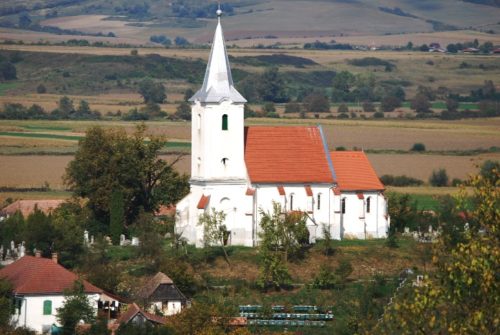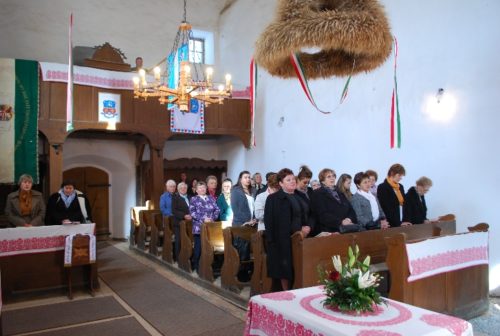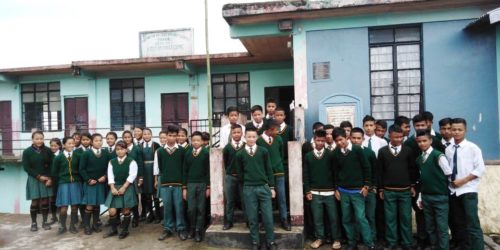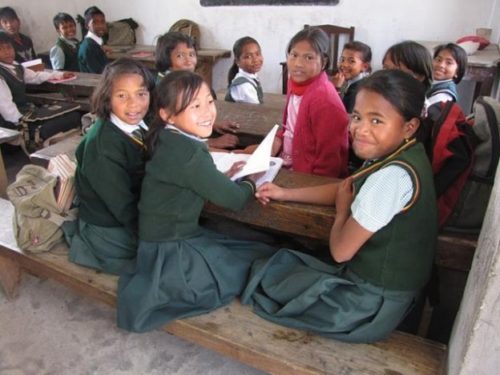By congregational vote, UUCF has entered into partnerships with two Unitarian congregations in other countries – the Szentgerice Unitarian Church in the Transylvania region of Romania (since 1990) and the Puriang Unitarian Church in the Khasi Hills of northeast India (since 2005). The mission of UUCF’s Partner Church program is to develop long-term, mutually supportive relationships with these Unitarians communities.
The Partner Church Circle administers UUCF’s Partner Church program with the following focus:
- Strengthening the bonds of friendship between members of UUCF and the people of Szentgerice and Puriang;
- Promoting the exchange of people and ideas;
- Deepening our understanding of our faith and its roots;
- Fostering mutual tolerance and respect among ethnic and religious groups in Transylvania and the Khasi Hills;
- Strengthening human rights and religious freedom for religious and ethnic minorities in Romania and India;
- Providing funding and other forms of assistance to directly help the Unitarian churches of Szentgerice and Puriang and to improve the quality of life of all inhabitants and foster economic development in both village communities.
Links
Szentgerice, Transylvania, Romania
 UUCF has been a partner with the Unitarian church in Szentgerice, Transylvania, Romania, since October 1990 shortly after the fall of communist dictator Nicolae Ceaucescu and the re-establishment of a partner church program by the Unitarian Universalist Association at the request of Transylvanian Unitarian church leaders. Szentgerice is a farming village of about 800 people (the Romanian name for the village is Galaţeni). It is an ethnic Hungarian community and Hungarian, rather than Romanian, is the primary language spoken there. A small resident Roma population lives on the outskirts of the village. The Unitarian Church was built in the 1300s as a Catholic church. The congregation voted to become Unitarian soon after the Edict of Religious Toleration in Transylvania in 1568. Extensive restoration began in 2018 and is continuing with support from the Hungarian government. The current minister is Rev. Barna (Barni) Varro-Bodoczi.
UUCF has been a partner with the Unitarian church in Szentgerice, Transylvania, Romania, since October 1990 shortly after the fall of communist dictator Nicolae Ceaucescu and the re-establishment of a partner church program by the Unitarian Universalist Association at the request of Transylvanian Unitarian church leaders. Szentgerice is a farming village of about 800 people (the Romanian name for the village is Galaţeni). It is an ethnic Hungarian community and Hungarian, rather than Romanian, is the primary language spoken there. A small resident Roma population lives on the outskirts of the village. The Unitarian Church was built in the 1300s as a Catholic church. The congregation voted to become Unitarian soon after the Edict of Religious Toleration in Transylvania in 1568. Extensive restoration began in 2018 and is continuing with support from the Hungarian government. The current minister is Rev. Barna (Barni) Varro-Bodoczi.
About half the people of Szentgerice are Unitarian; the others are members of the Reformed (Calvinist) Church. The two congregations work together as demonstrated by the Medical Clinic opened in 1999, which was sponsored financially by the partners of each congregation (UUCF and a Dutch Reformed congregation in the Netherlands) and built by village volunteers. The clinic is staffed by a government-paid doctor and visiting dentist and has operated on a self-sufficient basis for nearly 20 years.
Almost 200 UUCF members have visited and stayed in the village as part of group trips and individual visits. The Chorale undertook concert tours in Transylvania in 1992 and 2000, staying in Szentgerice each time. UUCF has sponsored three youth group trips as well as three inter-generational trips, the most recent in 2014.
About 20 members of the Szentgerice congregation have visited UUCF including a 2018 visit of 14 people during which they presented a festival demonstrating village traditions. Our partners have also given us many gifts that now grace the UUCF grounds, the Sanctuary and services including embroidered covers for our hymnals, traditional tapestries, the carved gateposts at the bridge to the Administration Building, the frame for our campus map and more.
Since 2000, UUCF has provided scholarships to Szentgerice high school, technical school and university students, helping to cover tuition, living costs and other educational expenses. Because the schools are located in cities, most Szentgerice students cannot live at home while pursuing their education. The recipients are selected, and amounts determined by a committee of Szentgerice residents.
Puriang, India
 UUCF’s partner church in India is in Puriang, a village of about 9,000 located in the remote Khasi Hills in the state of Meghalaya in northeast India, north of Bangladesh and south of Bhutan. The Khasi language and culture are distinct from that of India and are related to the Mon-Khmer language and culture of southeast Asia.
UUCF’s partner church in India is in Puriang, a village of about 9,000 located in the remote Khasi Hills in the state of Meghalaya in northeast India, north of Bangladesh and south of Bhutan. The Khasi language and culture are distinct from that of India and are related to the Mon-Khmer language and culture of southeast Asia.
The Puriang Unitarian Church is one of several churches in the village. It is a simple concrete building marked by a flaming chalice on the top. On Sundays, there are three services: one at 10 a.m. for children and their families, another at 1 p.m. for adults and a home-based service in the evening. An associate minister or lay members of the church conduct services on most Sundays. One of the circuit-riding professional Unitarian ministers conducts services on special occasions.
Next to the church is a Unitarian school that serves nearly 500 students from nursery school to 12th grade. Like all Unitarian schools in the Khasi Hills, the school is non-sectarian and open to all children regardless of religion. The school includes a computer lab with computers donated by the state government and has been rated as the seventh best school in the state based on student performance on standardized exams.
About two dozen UUCF members have visited Puriang beginning in 2004, including a group of four who visited in 2018. At the end of 2005, UUCF approved a partnership resolution with the Unitarian Church in Puriang. A partnership covenant was signed in 2010. UUCF began by providing funds to support the school including salary supplements for teachers, safety improvements and an annual gift such as a sweater or athletic shirt for students. As the school began to receive more direct funding from the government, UUCF has eased off direct monetary assistance for routine expenses.
In 2008, UUCF sponsored a community capacity building workshop attended by 200 residents of Puriang. The workshop identified and prioritized village needs and created an action plan. The top priority was for piping water to the village, which in turn was used to encourage the state government to build the long-promised water system. Most of the other priorities have now been implemented using state and local resources. UUCF continues to provide a regular supplement for the community’s emergency fund, which is administered by a village committee.
The circuit minister assigned to Puriang visited UUCF and attended the Unitarian Universalist Association’s (UUA) General Assembly in 2009. In 2011, the president of the Unitarian Union of Northeast India visited UUCF.
In 2008, a young UUCF member co-founded the Annie Margaret Barr Children’s Village orphanage in the village of Mawrsynjri. The orphanage is named for a British Unitarian missionary originally drawn to India in the 1930s to fight with Gandhi for Indian independence. Ms. Barr then worked with Indian Unitarians in the Khasi Hills until her death in 1973. The Children’s Village is now partnered with First Unitarian Church of Dallas and houses 24 children.
The native Khasi religion is distinct from Hinduism and Islam. It centers on the belief in one formless, omnipresent and omniscient God called U Blei. At the same time, other gods and goddesses manifest themselves as rivers, streams and jungles. The religion teaches that as one serves others, one serves God. The Khasi religion is still practiced by many in the Khasi Hills.
The basic tenets of Unitarianism arose independently in the Khasi Hills. In the 1880s, a Khasi student named Hajom Kissor Singh in a Welch Presbyterian missionary school began questioning Christian doctrine regarding the trinity. A teacher put him in touch with an American Unitarian minister in Calcutta (now Kolkata). Singh noted many common elements between Unitarianism and the native Khasi religion. On Sep. 18, 1887, Singh led the first Khasi Unitarian service in his home and by 1899, Khasi Unitarians numbered 214. In 2019, membership was over 10,000 people in 45 congregations in the northeast Indian states of Meghalaya and Assam. Unitarians in Meghalaya do not observe Christmas. Jesus is considered an important teacher, but not divine. Their major religious holiday is Founder’s Day on Sep. 18 each year. Founder’s Day has been designated as a state holiday. Most congregations sponsor a non-sectarian community school. Khasi Unitarians have long maintained relationships with Unitarians around the world including the UUA and the International Council of Unitarians and Universalists (ICUU).

